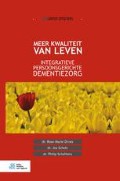Samenvatting
Dementie is een ontwrichtende aandoening. De essentie van deze ziekte is dat ze de persoon als zelfstandig denkend en handelend individu steeds verder afbreekt. Mensen met dementie houden gedurende het ziekteproces een zeker besef van deze aftakeling, in wisselende vorm en in wisselende mate
Access this chapter
Tax calculation will be finalised at checkout
Purchases are for personal use only
Literatuur
Hoogeveen FR. Leven met dementie. Houten: Bohn Stafleu van Loghum, 2008.
Clare L. We’ll fight it as long as we can: coping with the onset of Alzheimer’s disease. Aging Mental Health. 2002;6:139-48.
Phinney A. Fluctuating awareness and the breakdown of the illness narrative in dementia. Dementia. 2002;1:329-44.
Clare L. Managing threats to self: awareness in early stage Alzheimer’s disease. Soc Sci Med. 2003;57:1017-29.
Boer M de, Hertogh C, Dröes R, et al. Suffering from dementia: the patient’s perspective; an overview of the literature. Int Psychogeriatr. 2007;19:1021-39.
Steeman E, Godderis J, Grypdonck M, et al. Living with dementia from the perspective of older people: is it a positive story? Ageing Mental Health. 2007;11:119-30.
Hoogeveen FR. ‘Dat onthouden kan ik wel vergeten’. In gesprek met mijn dementerende vader. Denkbeeld. 2008;20:2-6.
Dröes RM, Boelens E, Bos J, et al. Quality of life in dementia in perspective: An explorative study of variations in opinions among people with dementia and their professional caregivers, and in literature. Dementia. 2006;5:533-58.
Dröes R, Roest H van der, Mierlo L van, Meiland F. Memory problems in dementia: adaptation and coping strategies and psychosocial treatments. Expert Rev Neurother. 2011;11:1769-82.
Dröes RM. In beweging: over psychosociale hulpverlening aan demente ouderen. Utrecht: De Tijdstroom, 1991.
Pearce A, Clare L, Pistrang N. Managing sense of self: Coping in the early stages of Alzheimer’s disease. Dementia. 2002;1:173-92.
Hoogeveen FR. ‘Ik ben hier nu toch!’ Nico Köhler over zijn levenshouding. Denkbeeld. 2014;26:18-21.
Dröes RM, Mierlo LD van, Roest HG van der, Meiland FJM. Focus and effectiveness of psychosocial interventions for people with dementia in institutional care settings from the perspective of coping with the disease. Nonpharmacol Ther Dement. 2010;1:139-61.
Woods P, Ashley J. Simulated Presence Therapy: using selected memories to manage problem behaviors in Alzheimer’s disease patients. Geriatr Nurs. 1995;16:9-14.
Camberg L, Woods P, Ooi W, et al. Evaluation of simulated presence: A personalized approach to enhance well-being in persons with Alzheimer’s disease. J Am Geriatr Soc. 1999;47:446-52.
Finnema E, Dröes R, Ettema T, et al. The effect of integrated emotion-oriented care versus usual care on elderly persons with dementia in the nursing home and on nursing assistants: a randomized clinical trial. Int J Geriatr Psychiatry. 2005;20:330-43.
Dröes RM, Meiland F, Schmitz M, Tilburg W van. Effect of combined support for people with dementia and carers versus regular day care on behaviour and mood of persons with dementia: Results from a multi-centre implementation study. Int J Geriatr Psychiatry. 2004;19:673-84.
Testad I, Corbett A, Aarsland D, et al. The value of personalized psychosocial interventions to address behavioral and psychological symptoms in people with dementia living in care home settings: a systematic review. Int Psychogeriatr. 2014;26:1083-98.
Groenendaal M, Hoogeveen FR, Perilli V, et al. Foutloos leren bij dementie. TVZ, Tijdschr Verpleegkundig Experts. 2014;124:46-8.
Hoogeveen FR, Groenendaal M, Caffo A, Perilli V. Lerend vermogen bij dementie. TVZ, Tijdschr Verpleegkundig Experts. 2014;124:42-5.
Kessels R, Olde Hensken L. Effects of errorless skill learning in people with mild-to-moderate or severe dementia: A randomized controlled pilot study. Neurorehabilitation. 2009;25:307-12.
Dirkse R, Kessels R, Hoogeveen FR, Dixhoorn I van. (Op)nieuw geleerd, oud gedaan. Utrecht: Kosmos, 2011.
Clare L, Wilson B, Carter G, et al. Intervening with everyday memory problems in dementia of Alzheimer type: an errorless learning approach. J Clin Exp Neuropsychol. 2000;22:132-46.
Perilli V, Lancioni G, Hoogeveen F, et al. Video prompting versus other instruction strategies for people with Alzheimer’s disease. Am J Alzheimers Dis Other Demen. 2013;28:393-402.
Caffo AO, Hoogeveen FR, Groenendaal E, et al. Comparing two different orientation strategies for promoting indoor traveling in people with Alzheimer’s disease. Res Dev Disabil. 2014;35:572-80.
Werd M de, Boelen D, Kessels R. Foutloos leren bij dementie: een praktische handleiding. Den Haag: Boom Lemma, 2013.
Perilli V, Hoogeveen F, Caffo A, et al. Self-management of instruction cues for promoting independent daily activities: review of studies with people with mild or moderate Alzheimer’s disease. Appl Res Today. 2012;1:20-35.
Bommel S van. Ik ben niet kwijt. Amsterdam: Prometheus, 2012.
Hoogeveen FR, Groenendaal M, Mulder B, et al. Radio Remember: internetradio voor mensen met dementie. Denkbeeld. 2014;26:6-9.
Williamson C, Alcantar O, Rothlind J, et al. Standardized measurement of self-awareness deficits in ftd and ad. J Neurol Neurosurg Psychiatry. 2010;81:1-16.
Author information
Authors and Affiliations
Editor information
Editors and Affiliations
Rights and permissions
Copyright information
© 2018 Bohn Stafleu van Loghum, onderdeel van Springer Media B.V.
About this chapter
Cite this chapter
Hoogeveen, F., Bos, J. (2018). Hulp om een positief zelfbeeld te behouden. In: Dröes, RM., Scheltens, P., Schols, J. (eds) Meer kwaliteit van leven. Bohn Stafleu van Loghum, Houten. https://doi.org/10.1007/978-90-368-2048-6_15
Download citation
DOI: https://doi.org/10.1007/978-90-368-2048-6_15
Publisher Name: Bohn Stafleu van Loghum, Houten
Print ISBN: 978-90-368-2047-9
Online ISBN: 978-90-368-2048-6
eBook Packages: Dutch language eBook collection

